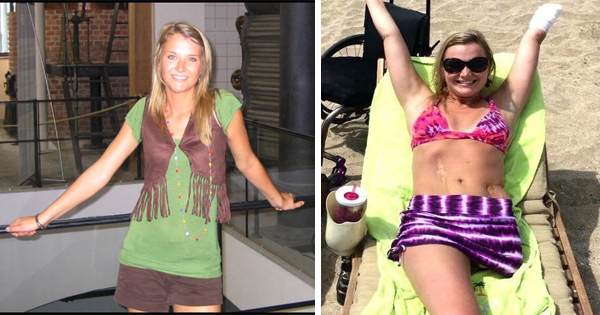Advertisement
Aimee Copeland, 28, is proud to say that she’s now living independently of her parents’ care, getting ready to begin a new job after earning two master’s degrees, has a new boyfriend, and is has even bigger plans for the future. This all happened within four years of her losing all four of her limbs.
On May 1, 2012, Copeland had just finished her semester at the University of West Georgia and got off her waitressing job when a friend called to hang out. Copeland heads over to her friend’s rented space in town, and the two decide to venture into the backyard.
While wading down a nearby creek, they discover a zip line – extending about six feet across and six feet above the water – and decide to give it a go.
During Copeland’s second turn, the zip line breaks. She falls into the creek. The jagged rocks below cut into her calf and she begins bleeding. At the hospital, the doctors close her wound, but her pain only gets worse over the next two days until she wakes up three days later to see that her entire left leg is rotting.
The leg is purple, her tongue is also shriveling, and she can barely tell her boyfriend, “I think I’m dying.”
At the hospital, doctors tell Copeland that she has necrotizing fasciitis, a tissue-destroying bacterial infection. While most infections caused by this disease are usually easily treated, the infection had entered Copeland’s body through her open wounds and was spreading, fast.
There was a chance Copeland could die. "I coded simply being moved from the stretcher to table and had to be resuscitated,” she recalled. The doctors said her odds of survival were slim to none.
It was during these first days of Copeland’s fight for her life that her doctors realized they had to amputate her left leg to keep the disease from spreading even more. The loss of her remaining limbs was, sadly, the price she paid for the medication that she took.
In order to keep her vital organs functioning, Copeland’s doctors gave her medication that promoted blood flow to the organs – but left her limbs starved of blood. Her hands “were curled up. They were dark purple in the palms, black at the fingertips.”
Copeland’s first coherent memory after entering the hospital was her dad saying to her, “You know, these aren't healthy. We're going to have to remove your hands. They could threaten your life.”
And Copeland knew this. When doctors later broke the news that they would have to remove all four of her limbs, she said simply, “Let’s do this.”

Now, four years later in 2016, Copeland has reached a good place in her life. She’s not only graduated out of living with her parents, but she’s conquered navigating and traveling with her wheelchair, she’s working out to become more independent with prosthetic limbs and her chair, and has big plans to start a non-profit counseling center for people “who've faced traumatic, life-threatening injuries.”
Copeland’s attitude toward life now is that she knows “can pretty much take anything. There’s no news that could match up with, ‘We’re taking all your limbs off.’”





